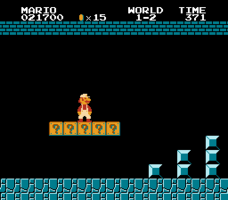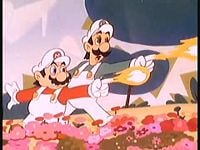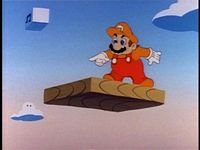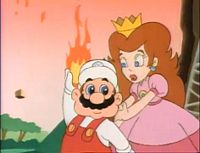Fire Mario
Template:Diff Template:Form-infobox Fire Mario and Fire Luigi are the forms Mario and Luigi take after powering up with a Fire Flower. The form was first introduced in Super Mario Bros., and is one of the few forms to appear in more than one game. Wario also made use of a Fire Flower to become Fire Wario in a last-ditch attempt to defeat Mario in Super Mario Land 2: 6 Golden Coins. Strangely, the fireballs produced by these abilities can be thrown underwater.
Fire Mario is one of the many ways, possibly safest along throwing a Shell, under the power of a Starman or being Hammer Mario, to take out Hammer Bros. and their relatives, since you can just throw fireballs at them. Hammer Mario is a Hammer Bro. version of Fire Mario, except the hammers can take out enemies that fireballs can't.
History
Super Mario Bros. series
Super Mario Bros.

In the form's first appearance, in Super Mario Bros. (and later in the Japan-only sequel, Super Mario Bros.: The Lost Levels), both Mario and Luigi's hats and overalls would change to white and their shirts would change to red. In the remake, Super Mario Bros. Deluxe, Fire Luigi kept the white cap and overalls, but his shirt turned green (same as Luigi's regular colour-sceme in the original version), while in his regular form he wore a green cap, green overalls and a brown shirt.
They became Fire Mario or Fire Luigi after coming in contact with a Fire Flower, thus gaining the ability to throw fireballs. However, Mario (or Luigi) would revert back to Small Mario (or Small Luigi) if they were to take damage. The fireballs would bounce along the ground and could defeat almost all enemies, including otherwise unbeatable ones such as Spinies; they were also Mario and Luigi's only means of offense in underwater stages. Interestingly, using fireballs to defeat Bowser was the only method that yielded points.
Super Mario Bros. 3
After a brief absence from Super Mario Bros. 2, Fire Mario returned in Super Mario Bros. 3 with one slight change in that Mario and Luigi would both change to an orange colorization instead of their clothing changing. However, this may be because of limitations on the NES, as official artwork and remakes of the game depict Mario with red overalls and a white hat and shirt. This was the first game where, if damage was taken, they would only revert to their super form.
New Super Mario Bros.
After the release of Super Mario Land 2: 6 Golden Coins, Fire Mario did not make another appearance for fourteen years, finally returning in New Super Mario Bros.. Fire Mario (and Fire Luigi) functioning exactly the same as they did in the earlier Super Mario Bros. titles; however, they were no longer Mario's highest form attainable. Many new power-ups were introduced, and would simply over-ride the Fire form when their items were encountered and utilized. However, when Mario or Luigi gets hit, the will become Super Mario.
Super Mario Galaxy
Fire Mario made its 3D platformer debut in Super Mario Galaxy, found in the Freezeflame Galaxy, Dusty Dune Galaxy and Deep Dark Galaxy, with a few changes, such as the form being time-limited instead of being lost by taking damage (which meant Mario could now be hit and still retain this form), the fireballs could no longer be used underwater and Mario wouldn't be able to Spin until the form wore off.
TV cartoon trilogy
Super Mario Bros. Super Show!
In the Super Mario Bros. Super Show!, this form was called Super Mario or Super Luigi, due to their actual Super forms being their regular forms. some of the differences from the games where that the form wasn't just acheived with Fire Flowers, but also Stars, a Magic Pendant and at one point, a shock from a high voltage. In some instances, the form itself was referred to as Fire Power, a name which carried over into the two following series. As well as granting the Mario Bros. with the ability to shoot fireballs from their fingers, the form endowed them with extra strength, speed and even the ability to fly. Toad also used this form in the episode "The Fire of Hercufleas". Princess Toadstool turned into this form in "The Trojan Koopa", although she did not shoot fire. In a later episode, Toad gets kidnapped by a Birdo and the Mario Bros set off to rescue him. Later they fall into a pit and grabs a fire flower, which gives him the ability to shoot fire balls.
The Adventures of Super Mario Bros. 3
In The Adventures of Super Mario Bros. 3, the form was changed to match its appearance in Super Mario Bros. 3: Mario had colourization and could only throw fireballs. Bowser, with the help from the Power Pendant, could also use this form in the episode "Super Koopa".
Super Mario World
In the Super Mario World cartoon the forms appearance was changed again to match its appearance in Super Mario World. However, the form had very limited screen time in this series; it was only featured in the episodes "Send in the Clown" and "King Scoopa Koopa".
Comics
Strangely, the comics almost never featured either form. The only appearance was in the prologue short, "The Legend"; in one panel, Luigi was shown throwing fireballs at some Beezos, but he was wearing his regular outfit rather than his Fire Luigi suit.
Super Mario World
Fire Mario's appearance in Super Mario World was the first time he appeared in-game as depicted in artwork. It was also the first time that Fire Luigi had a different colorization from Fire Mario. They retained all the skills found in earlier releases, with the added ability to throw two fireballs at either side of themselves when using the new Spin Jump move. In the GBA remake, if they got damaged, they would change back to their super form, like in Super Mario Bros. 3.
Super Mario Land series
While Fire Mario didn't appear in Super Mario Land, a form very similar to it, known as Superball Mario, made its first and only appearance.
Super Mario Land 2: 6 Golden Coins
In Super Mario Land 2: 6 Golden Coins, the form's appearance was changed again, this time only simply adding a feather to the top of Mario's cap (most likely due to the Game Boy's inability to display the colour difference). Additionally, in the final phase in the battle with Mario, Wario used a Fire Flower to become Fire Wario (again, by added a feather to his cap) and resorted to fighting solely by throwing fireballs. He was still defeated, causing him to revert to Tiny Wario and run away.
Game Appearances
| Title | Description | Release Date | System/Format |
|---|---|---|---|
| Super Mario Bros. | Playable Character (power up) | 1985 | NES |
| Super Mario Bros.: The Lost Levels | Playable Character (power up) | 1986 | NES |
| All Night Nippon Super Mario Bros. | Playable Character (power-up) | 1986 | Famicom Disk System |
| Vs. Super Mario Bros. | Playable Character (power-up) | 1986 | Arcade |
| 2-in-1 Super Mario Bros./Duck Hunt | Playable Character (power-up) | 1988 | NES |
| Super Mario Bros. 3 | Playable Character (power-up) | 1988 | NES |
| 3-in-1 Super Mario Bros./Duck Hunt/World Class Track Meet | Playable Character (power-up) | 1990 | NES |
| Super Mario World | Playable Character (power-up) | 1990 | SNES |
| Super Mario Land 2: 6 Golden Coins | Playable Character (power-up) | 1992 | Game Boy |
| Super Mario All-Stars | Playable Character (power-up) | 1993 | SNES |
| Super Mario All-Stars + Super Mario World | Playable Character (power-up) | 1994 | SNES |
| Super Mario Bros. Deluxe | Playable Character (power-up) | 1999 | Game Boy Colour |
| Mario Golf | Playabler Character (alternate colour scheme) | 1999 | Nintendo 64 |
| Super Mario World: Super Mario Advance 2 | Playable Character (power-up) | 2001 | Game Boy Advance |
| Animal Crossing | Playable Character (power-up) in unlockable port of Super Mario Bros. | 2001 | Nintendo GameCube |
| Super Mario Advance 4: Super Mario Bros. 3 | Playable Character (power-up) | 2003 | Game Boy Advance |
| Classic NES Series: Super Mario Bros. | Playable Character (power-up) | 2004 | Game Boy Advance |
| Classic NES Series: Super Mario Bros.: The Lost Levels | Playable Character (power-up) | 2004 | Game Boy Advance |
| New Super Mario Bros. | Playable Character (power-up) | 2006 | Nintendo DS |
| Wii Shop Channel | Appears on Download Screen sometimes | 2006 | Wii |
| Super Mario Galaxy | Playable Character {power-up) | 2007 | Wii |
| Super Smash Bros. Brawl | Playable Character (Alternate colour scheme) and as power-up in demo of Super Mario Bros.. | 2008 | Wii |
| Mario & Luigi: Bowser's Inside Story | Playable Character (special attack) | 2009 | Nintendo DS |
| New Super Mario Bros. Wii | Playable Character {power up) | 2009 | Wii |
Gallery
- Fire Mario SMB3.jpg
Another image of Fire Mario from Super Mario Bros. 3 - 1897.jpg
Fire Mario with a feather on his cap, from Super Mario Land 2: Six Golden Coins. Fire Mario from Super Mario Galaxy
Trivia
- In Super Mario Bros., Fire Mario was known as Firey Mario.
- Mario has previously been able to use Fire without being Fire Mario, though these instances were when power-ups didn't appear, such as Super Mario RPG: Legend of the Seven Stars or Super Smash Bros.. Also, Mario could create a fireball by using the acquired Firebrand skill in Mario & Luigi: Superstar Saga.
- In Mario & Luigi: Partners in Time, Mario, Luigi, Baby Mario and Baby Luigi could use fireballs when using the Brothers Items, Bros. Flower and Mix Flower.
- Fire Mario and Fire Luigi appear as alternate colors for Mario and Luigi in Super Smash Bros. Brawl.
- In Mario & Luigi: Bowser's Inside Story, when Mario and Luigi use a Fire Flower, they change into their Fire suits.
- In Mario Golf, one of Mario's color changes is Fire Mario.




